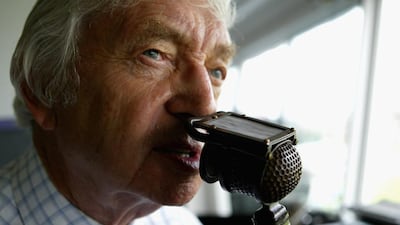I cannot remember the first time I heard Richie Benaud. He was always wherever good cricket was, though.
Had it not been for YouTube and the cult of Richie – he had become so mainstream as to not qualify as a cult anymore – I may not be able to instantly recall one of his many great broadcasting moments.
After recently again viewing Wasim Akram’s castle-ing of Allan Lamb in the 1992 World Cup final, the beauty of Benaud’s soundtrack struck home: sparse and incredibly evocative, like desert terrain, and a reminder of how beautiful and simple language and sound are.
“What a great delivery, left-arm around the wicket, Allan Lamb has been cleaned up” – the last six words with greater emphasis, then a two-second pause – “perhaps” – and a one-second pause before the verdict – “so too England”.
In that way, he hit the highs of the greatest wildlife documentary narration, permanently hushed, rising not so much in volume but in degrees of emphasis.
Then, in setting up the replay, the vital but entirely non-intimidating technical enlightenment: why was it a great delivery?
“It’s an unusual action and direction, to come left-arm around at that pace.” That was it. No weighing down the joy and mood of those scenes with overdone analytical dissections – “that will come in its own good time, rest assured, but, for now, enjoy what feels like a pivotal and, perhaps, a great cricketing moment”.
In any case, his credentials as a cricket brain were evident earlier in that over.
As co-commentator Tony Cozier noted the absence of Inzamam-ul-Haq in the field, Benaud perceptively warned the cricket world that maybe, just maybe, Inzamam, who had just emerged on the global radar, may never reconcile himself to fielding duties.
At the time, it barely registered with me, partially, I am sure, because at 15 years of age a moving frenzy on a bright screen was about all limited attention could be devoted to.
But I also barely could recall instantly this and other Benaud moments, because that was the point of Benaud.
It was not that what he said was unmemorable, it was simply that he let the action always be the bit that you took away from the experience of watching cricket on TV.
My takeaway from that moment was precisely what it should be – the genius of Akram’s delivery. That should be the point of all great sports commentary and, obvious though it is, it is not easily achieved.
One of the reasons why Benaud’s passing is felt so deeply is because of the jarring counterpoint of cricket commentary today, not least at Australia’s Channel 9, with which Benaud will be forever inextricably linked.
The irony is that Benaud was the father of modern commentary as part of Channel 9 since the Packer years, and his pioneering brief was not just to call a game, but sell it. Even among salesmen, though, there is honour and Benaud had it.
It never felt like selling so much as gentle persuasion over the course of an afternoon that, well, yes, this has been a marvellous afternoon and maybe you should come more often.
Selling techniques, alas, have changed as much as the salesmen.
For a man so associated with moving images, my first distinct memory of him is a photograph of his playing days.
He is in his bowling follow through, shirt unbuttoned to the sternum and billowing. Even though it is black and white, his chest gives the impression of being bronzed.
With the sleeves rolled up and physical effort obvious, as a whole, the picture has a faintly epic sense to it, like it could be a lost publicity still of Charlton Heston in Ben-Hur.
He looks so young and vital and definitely like he might be great evening company.
I remember it because it was so in contrast to the sober suited, relatively unexpressive older man I came to know on TV. It was also so obviously revealing of another Benaud – the Benaud of player and captain.
He was unique in that era in how animated he could get, especially celebrating wickets with vigour and variety much greater than just a nod and pat on the back.
His captaincy was ahead of its time, but so, too, was his appealing for lbws, which, though polite, must have been greeted with the same tut-tuts reserved once for men with long hair and other indiscretions of youth.
The day I saw that photograph was when I began wondering what Benaud commentating to Benaud’s bowling would have been like, and to those appeals.
My guess is a wry line and a sentence or two of sharp insight, revealing the preparedness that bound his many professional roles.
I imagine I would have remembered only the bowling.
osamiuddin@thenational.ae
Follow our sports coverage on Twitter @NatSportUAE

